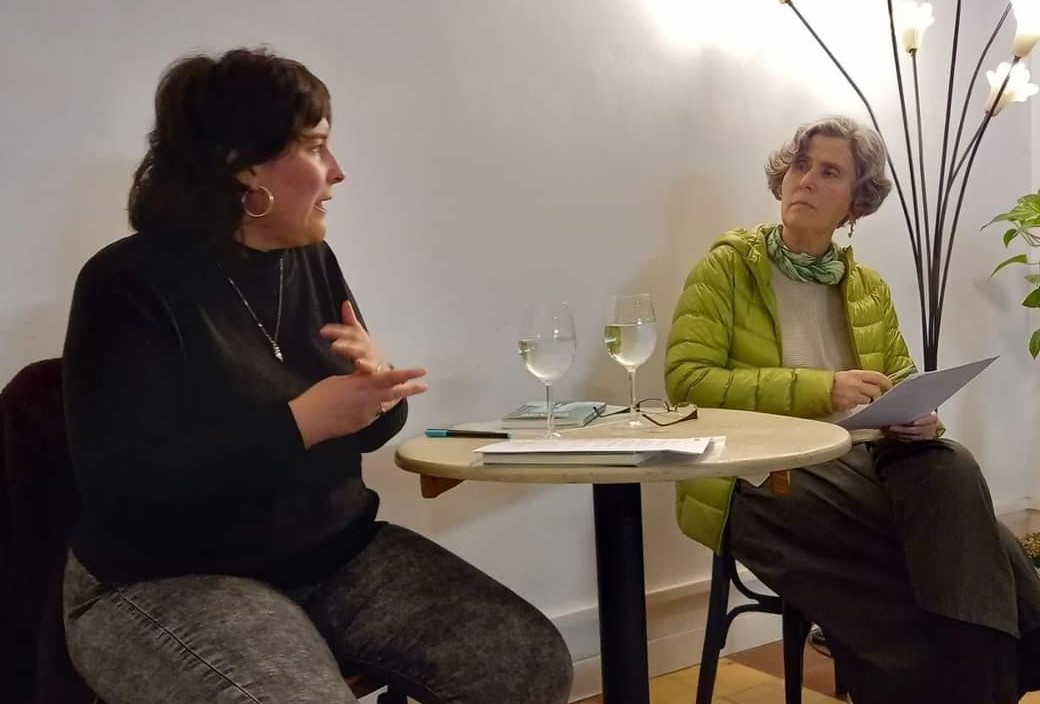Collapse

The first time it was in Barrika, when he couldn't understand what his friends were saying around the beach. The words coming out of his mouths made no sense to Nagore. It was as if I was out of reality. His friends' lips moved and uttered the sounds, but they made him incomprehensible. This is how Nagore Gartzia Fernández begins (Sopela, 1984) his book Collapse (The Hedonists, 2021).
Presentation of the book 'Collapse'
WHEN: 1 March
WHERE: Library Louise
Michel (Bilbao)
The Pixies group sang “your feet in heaven and head on earth” Where is my mind? in the song. It felt like Nagore, like his world, even if it was in small intervals, didn't make sense. This confusion worsened, especially when this event became repetitive. So he started a journey that seemed endless. He went from one consultation to another, accumulating tests and faces of different doctors hoping to get a correct diagnosis.
Nagore is encouraged to tell her story, first in writing and then with presentations to the public in the company of anthropologist Mari Luz Esteban. William S. American writer Burroughs stated that language is an alien virus and that the only remedy to get rid of the disease it produces is to write, that we would only be getting the word out of the body and making it correlate. Nagore seems to have followed Burroughs' recommendation. His research and ethnographic character has been linked to his passion for writing coming from a young age to write not only about his illness, but also about his hard journey.
The symptoms were clear: I lost the ability to understand the words in small intervals of time, from time to time, but more and more frequently. He had to visit the entire health system until he had a precise diagnosis: his illness was the result of a type of epilepsy. But in Nagore's story, as in all accounts, the important thing is not the objective, in this case the diagnosis, but the path. The writer has described and analyzed the impact of biopolitics on us from a personal point of view. Its objective is the violence and discipline of medicine and medicines, among others. His personal collapse is not the only one behind the title of the book, as the sopelan has talked about the collapse of the health system, the collapse of late capitalism and its influence on our health, the collapse of the cities, which have become irresistible until the expulsion of the population. Nagore also has his friends present in his story, and he often talks about those who have supported and helped him in fear and ignorance. Surrounding yourself with a powerful network of protection and community is more important than ever in times of collapse.
You may not know who Donald Berwick is, or why I mention him in the title of the article. The same is true, it is evident, for most of those who are participating in the current Health Pact. They don’t know what Berwick’s Triple Objective is, much less the Quadruple... [+]
Indartsua, irribarretsua eta oso langilea. Helburu pila bat ditu esku artean, eta ideia bat okurritzen zaionean buru-belarri aritzen da horretan. Horiek dira Ainhoa Jungitu (Urduña, Bizkaia, 1998) deskribatzen duten zenbait ezaugarri. 2023an esklerosi anizkoitza... [+]
Pazienteek Donostiara joan behar dute arreta jasotzeko. Osasun Bidasoa plataforma herritarrak salatu du itxierak “are gehiago hondatuko” duela eskualdeko osasun publikoa.
EAEn BAMEa (famili medikuen formazioa) lau urtetik hiru urtetara jaistea eskatu du Jaurlaritzak. Osakidetzaren "larritasunaren" erantzukizuna Ministerioari bota dio Jaurlaritzako Osasun sailburu Alberto Martinezek: "Ez digute egiten uzten, eta haiek ez dute ezer... [+]
Sare sozialen kontra hitz egitea ondo dago, beno, nire inguruan ondo ikusia bezala dago sare sozialek dakartzaten kalteez eta txarkeriez aritzea; progre gelditzen da bat horrela jardunda, baina gaur alde hitz egin nahi dut. Ez ni optimista digitala nauzuelako, baizik eta sare... [+]
Berrogei urte dira Euskal Herrian autismoaren inguruko lehen azterketak eta zerbitzuak hasi zirela. Urte hauetan asko aldatu da autismoaz dakiguna. Uste baino heterogeneoagoa da. Uste baino ohikoagoa. Normalagoa.
Itxaron zerrendak gutxitzeko Osasunbideak hartutako estrategiak gaitzetsi ditu Plataformak




















